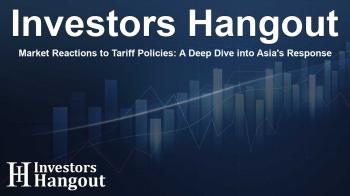Market Reactions to Tariff Policies: A Deep Dive into Asia's Response

Mixed Signals from Asian Markets
Asian stocks exhibited a varied response amidst swirling uncertainties following the recent tariff announcements from the U.S. President. Investors approached the market with caution as the news cycle buzzed with speculation regarding future tariffs that could influence global trade dynamics.
Investor Sentiment Amidst Economic Shifts
The unpredictable nature of global markets was evident as risk-driven assets faced heightened volatility. As U.S. President Trump introduced a range of executive orders on his first day, from pushing for increased U.S. oil production to reconsidering bans on popular social media platforms, market participants remained skittish. The announcement that steep tariffs on China were not enforced, as many had anticipated, left traders in a realm of uncertainty.
Futures tied to U.S. stock indices showed modest gains during the Asian trading session, yet traders were struck by the looming questions over Trump's tariff strategies. The specter of potential tariffs on China, coupled with existing ones on Mexico and Canada, raised doubts about economic stability. The Asian markets, which had surged in earlier sessions, grappled with these considerations, causing fluctuations in stock prices.
Regional Market Performance Insights
In the regional landscape, various stock indexes showcased contrasting performances. Australia's ASX 200 witnessed a slight uptick of 0.6%, buoyed by optimistic sentiments regarding domestic economic resilience. Conversely, Singapore’s Straits Times index exhibited a decline of 0.6%, mirroring investor caution.
Meanwhile, China's Shanghai Shenzhen CSI 300 and Shanghai Composite indexes faced minor setbacks, reflecting the unease over potential trade disruptions. Hong Kong's Hang Seng index, however, managed a gain of 0.8%, suggesting a more optimistic outlook among its investors.
In South Korea, the KOSPI fell by 0.3%, while futures for India's Nifty 50 pointed towards a negative open, indicating a globalization of the market's response to current events. Each market exhibited its unique reactions, driven by local economic conditions and broader international narratives.
U.S. Trade Policies and Their Implications
Trump's hesitation to act immediately against Mexico and Canada did little to assuage fears of impending trade tariffs. His proposed America First trade policy emphasizes a thorough review of unfair practices among countries, illuminating the potential for significant shifts in trade relationships.
This strategy raises the stakes for global commerce, as higher tariffs could prompt retaliatory measures and escalate into broader trade conflicts. While there are concerns, China may respond with stimulus measures aimed at bolstering economic growth in light of these challenges—an action that may stabilize its domestic market amidst external pressures.
Outlook for Japanese Markets Ahead of BOJ Meeting
Turning to Japan, the Nikkei 225 and TOPIX indexes remained relatively stable, with traders awaiting the outcomes of the upcoming Bank of Japan (BOJ) meeting. The anticipation around potential interest rate hikes introduced a layer of caution among investors, particularly in sectors that might bear the brunt of such monetary policy shifts.
Market watchers speculated that if the BOJ were to raise interest rates, it might indicate growing confidence in Japan's economy, which could uplift domestically-focused sectors. However, for export-driven industries, a strengthening yen in response to rate hike expectations could introduce fresh challenges.
Frequently Asked Questions
What factors are influencing Asian stock market volatility?
Recent tariff announcements and uncertainty around U.S. trade policies are significant forces affecting market stability and investor sentiment across Asia.
How did U.S. tariffs impact investment strategies in Asia?
Investors are recalibrating their strategies, weighing the potential impacts of U.S. tariffs on trade relationships, which may hinder or promote growth in different sectors.
What was the market response to the Bank of Japan's anticipated policy decisions?
The Japanese markets are closely watching the BOJ's upcoming meeting as potential interest rate changes could greatly influence investor behavior and market direction.
How is China expected to react to U.S. trade tariffs?
China is likely to implement additional stimulus measures to mitigate the impact of U.S. tariffs, supporting local growth amidst the trade tensions.
What are the broader implications of U.S. trade strategies on global markets?
U.S. trade strategies can disrupt global economic ties and provoke retaliatory actions, sparking potential trade wars that could have widespread consequences.
About The Author
Contact Ryan Hughes privately here. Or send an email with ATTN: Ryan Hughes as the subject to contact@investorshangout.com.
About Investors Hangout
Investors Hangout is a leading online stock forum for financial discussion and learning, offering a wide range of free tools and resources. It draws in traders of all levels, who exchange market knowledge, investigate trading tactics, and keep an eye on industry developments in real time. Featuring financial articles, stock message boards, quotes, charts, company profiles, and live news updates. Through cooperative learning and a wealth of informational resources, it helps users from novices creating their first portfolios to experts honing their techniques. Join Investors Hangout today: https://investorshangout.com/
The content of this article is based on factual, publicly available information and does not represent legal, financial, or investment advice. Investors Hangout does not offer financial advice, and the author is not a licensed financial advisor. Consult a qualified advisor before making any financial or investment decisions based on this article. This article should not be considered advice to purchase, sell, or hold any securities or other investments. If any of the material provided here is inaccurate, please contact us for corrections.

